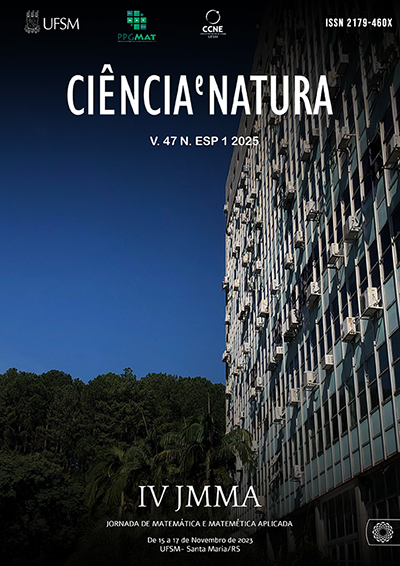A compartmental mathematical model for the study of mpox in Brazil
DOI:
https://doi.org/10.5902/2179460X90628Keywords:
Epidemiological model, SEIR, Mpox, Vaccine, InterdisciplinaryAbstract
This work presents the study of a SEIR-type epidemiological model to analyze mpox data in Brazil. The model considered is solved by the fourth-order and four-stage Runge-Kutta method and the curves of infected individuals over time are estimated. The model is validated with data from an epidemic outbreak that occurred in 1972 in Kosovo. Using data from the mpox virus outbreak in Brazil in 2022, it was found that the model simulation had the same behavior as the outbreak that occurred in Kosovo.
Downloads
References
Agˆencia Brasil (2023). OMS declara fim da emergˆencia em sa´ude por mpox. https://agenciabrasil.ebc.com.br/saude/noticia/2023-05/oms-declara-fim-da-emergencia-em-saude-por-mpox.
Centro de Operç˜oes de Emergˆencias (2023). Boletim epidemiol´ogico de mpox nº 20 (COE). https://www.gov.br/saude/pt-br/centrais-de-conteudo/publicacoes/boletins/epidemiologicos/variola-dos-macacos/
boletim-epidemiologico-de-monkeypox-no-20-coe/view.
Cori, A., Ferguson, N. M., Fraser, C., & Cauchemez, S. (2013). A new framework and software to estimate time-varying reproduction numbers during epidemics.
American Journal of Epidemiology, 178(9):1505–1512.
Fenner, F., Henderson, D. A., Arita, I., JeZek, Z., & Ladnyi, I. (1988). Smallpox and its Eradication. World Health Organization.
Franz, D. R. (1997). Reconhecimento cl´ınico e manejo de pacientes expostos a agentes de guerra biol´ogica. The Journal of Infectious Diseases, 278(5):399–411.
G1 (2023). Cidade de SP começa a vacinar nesta quarta-feira contra mpox adultos com mais risco de desenvolver a doença. https://g1.globo.com/sp/sao-paulo/noticia/2023/03/22/cidade-de-sp-comeca-a-vacinar-nesta-quarta-feira-
contra-mpox-adultos-com-mais-risco-de-desenvolver-a-doenca.ghtml.
Hethcote, H. W. (2000). The mathematics of infectious diseases. Mathematical Biosciences, 42(4):599–653.
Islam, M. A. I., Mubassir, M., Paul, A. K., & Shanta, S. S. (2024). A mathematical model for understanding and controlling monkeypox transmission dynamics in the usa and its implications for future epidemic management. Decoding Infection and Transmission, 2:10031.
Mack, T. M. (1972). Smallpox in europe, 1950–1971. The Journal of Infectious Diseases, 125(2):161–169.
Mack, T. M., Thomas, D. B., Ali, A., & Khan, M. M. (1972). Epidemiology of smallpox in west pakistan: I. acquired immunity and the distribution of disease. American Journal of Epidemiology, 95(2):157–168.
Mar´ın-Machuca, O., Ortiz-Guizado, J. I., Alvarado-Zambrano, F. A., Candela-D´ıaz, J. E., Chinchay-Barrag´an, C. E., Alvarado-Zambrano, R. A., Apaza-Urbina, M. A., Mar´ın-S´anchez, U., Rueda, M. P. R., & Castillo-Pe˜na, A. (2024). Comparaci´on estad´ıstica de la infecci´on por la viruela del mono (mpox) entre norteam´erica y sudam´erica. Biotempo, 21(1):11–21.
Minist´erio da Sa´ude (2022). Brasil confirma primeiro caso de monkeypox. https://www.gov.br/saude/pt-br/canais-de-atendimento/sala-de-imprensa/notas-a-imprensa/2022/brasil-confirma-primeiro-caso-de-monkeypox.
Molla, J., Sekkak, I., Ortiz, A. M., Moyles, I., & Nasri, B. (2023). Mathematical modeling of mpox: A scoping review. One Health, 16:100540.
Organização Pan-Americana da Sa´ude (2023). Organizac¸ ˜ao Mundial da Sa´ude declara fim da Emergˆencia de Sa´ude P´ublica de Importˆancia Internacional.
Pal, M., Mengstie, F., & Kandi, V. (2017). Epidemiology, diagnosis, and control of monkeypox disease: A comprehensive review. American Journal of Infectious Diseases and Microbiology, 5(2):94–99.
Santos, A. M. O. (2023). Aplicaç˜ao de um modelo matem´atico seir com quarentena e vacinaç˜ao para o estudo da mpox no brasil. [Dissertação de Mestrado, Programa de P´os-Graduação em Modelagem Matem´atica, Universidade Federal de Pelotas]. Reposit´orio Institucional da Universidade Federal de Pelotas (Guaiaca).
Thompson, R. N., Stockwin, J. E., van Gaalen, R. D., Polonsky, J. A., Kamvar, Z. N., Demarsh, P. A., Dahlqwist, E., Li, S., Miguel, E., Jombart, T., Lessler, J., Cauchemez, S., & Cori, A. (2019). Improved inference of time-varying reproduction numbers during infectious disease outbreaks. Epidemics, 29:100356.
World Health Organization (2022). Multi-country outbreak of mpox.
World Health Organization (2024). Surveillance, case investigation and contact tracing for mpox (monkeypox): Interim guidance, 20 March 2024. https://www.who.int/publications/i/item/WHO-MPX-Surveillance-2024.1.
Downloads
Published
How to Cite
Issue
Section
License
Copyright (c) 2025 Ciência e Natura

This work is licensed under a Creative Commons Attribution-NonCommercial-ShareAlike 4.0 International License.
To access the DECLARATION AND TRANSFER OF COPYRIGHT AUTHOR’S DECLARATION AND COPYRIGHT LICENSE click here.
Ethical Guidelines for Journal Publication
The Ciência e Natura journal is committed to ensuring ethics in publication and quality of articles.
Conformance to standards of ethical behavior is therefore expected of all parties involved: Authors, Editors, Reviewers, and the Publisher.
In particular,
Authors: Authors should present an objective discussion of the significance of research work as well as sufficient detail and references to permit others to replicate the experiments. Fraudulent or knowingly inaccurate statements constitute unethical behavior and are unacceptable. Review Articles should also be objective, comprehensive, and accurate accounts of the state of the art. The Authors should ensure that their work is entirely original works, and if the work and/or words of others have been used, this has been appropriately acknowledged. Plagiarism in all its forms constitutes unethical publishing behavior and is unacceptable. Submitting the same manuscript to more than one journal concurrently constitutes unethical publishing behavior and is unacceptable. Authors should not submit articles describing essentially the same research to more than one journal. The corresponding Author should ensure that there is a full consensus of all Co-authors in approving the final version of the paper and its submission for publication.
Editors: Editors should evaluate manuscripts exclusively on the basis of their academic merit. An Editor must not use unpublished information in the editor's own research without the express written consent of the Author. Editors should take reasonable responsive measures when ethical complaints have been presented concerning a submitted manuscript or published paper.
Reviewers: Any manuscripts received for review must be treated as confidential documents. Privileged information or ideas obtained through peer review must be kept confidential and not used for personal advantage. Reviewers should be conducted objectively, and observations should be formulated clearly with supporting arguments, so that Authors can use them for improving the paper. Any selected Reviewer who feels unqualified to review the research reported in a manuscript or knows that its prompt review will be impossible should notify the Editor and excuse himself from the review process. Reviewers should not consider manuscripts in which they have conflicts of interest resulting from competitive, collaborative, or other relationships or connections with any of the authors, companies, or institutions connected to the papers.






